How to Raise an Intuitive Eater: Part I with Sumner Brooks, MPH, RD, CEDRD
- The meaning of intuitive eating and how parents can successfully raise babies to be intuitive eaters
- Misconceptions about intuitive eating and defines the importance of viewing food as a source of nourishment and satisfaction
- How intuitive eating allows our babies to be naturally curious and accepting when it comes to food which results in building a healthy feeding relationship
- Ways in which parents can balance the idea of offering the appropriate nutrients a baby needs but also helping a baby to have success in navigating the variety of foods that are offered to them
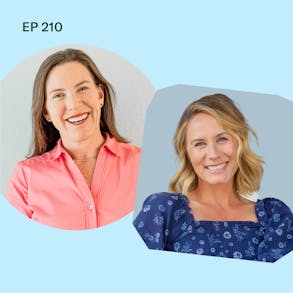
LISTEN TO THIS EPISODE
Episode Description
What is intuitive eating? And how can I raise my baby to be an intuitive eater? Finding a balance between offering a variety of foods and the necessary nutrition is an important key to creating a healthy relationship between a baby and food.
This is a two-part interview series with the co-authors of the book ‘How to Raise an Intuitive Eater: Raising the Next Generation with Food and Body Confidence’. In this episode co-author and registered dietitian Sumner Brooks, MPH, RDN, CEDRD defines what intuitive eating is and how infants are naturally born as intuitive eaters. She also discusses the importance of allowing our babies to develop their curiosity for trying new foods through feeling, touching, and experiencing food without the need to “push” them to do so.
About the Guest
- Sumner Brooks, MPH, RDN, CEDRD is a registered dietitian and mom of two. She is an advocate for intuitive eating and co-author for the book How to Raise an Intuitive Eater.
- Sumner has a strong background in eating disorders and has worked as an outpatient Dietitian and counselor with disordered eating clients for over 10 years.
- She is the founder of Eating Disorder Registered Dietitian Professionals (EDRDPRO) organization which helps support and educate fellow dietitians and other nutrition professionals about eating disorders and weight-inclusive approaches to intuitive eating.

Links from This Episode
- FOLLOW Sumner Brooks, MPH, RDN, CEDRD on Instagram @intutiveeatingRD
- CHECK OUT the book: How to Raise an Intuitive Eate: Raising the Next Generation with Food and Body Confidence
- CLICK to read more about the authors at Intuitive Eating 4 Kids
- Bookshop.com
- Goodreads.com
- Amazon.com

- Baby-Led Weaning with Katie Ferraro program with the 100 First Foods™ Daily Meal Plan, join here: https://babyledweaning.co/program
- Baby-Led Weaning for Beginners free online workshop with 100 First Foods™ list to all attendees, register here: https://babyledweaning.co/baby-led-weaning-for-beginners

Latest Episodes

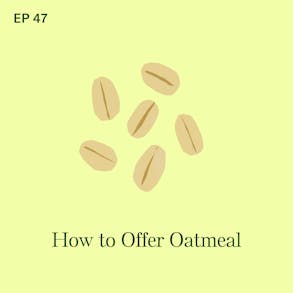
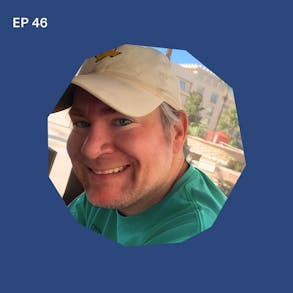
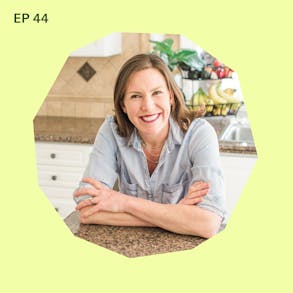
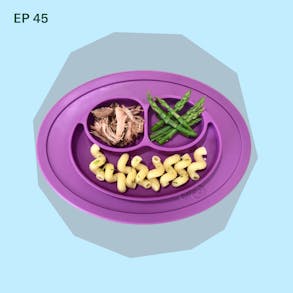
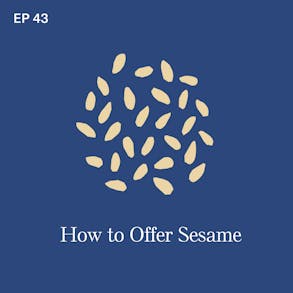
Sumner Brooks (0s):
I want my child to love vegetables. So that means I have to make them eat all these vegetables, right from the very beginning. If we treat all foods equally, they're going to have a better chance of having this neutral stance. More accepting, more curious.
Katie Ferraro (15s):
Hey, there I'm Katie Ferraro Registered Dietitian college nutrition professor and mom of seven specializing in baby-led weaning here on the baby-led weaning made easy podcast. I help you strip out all of the noise and nonsense about feeding, leaving you with the competence and knowledge. You need to give your baby a safe start to solid foods using baby-led weaning. Hey guys, welcome. And I am so excited about today's interview. This is part one of a two part series called How to Raise an Intuitive Eater. And I am interviewing one half of the author team who wrote the new book called just that, How to Raise an Intuitive Eater today.
Katie Ferraro (1m 1s):
My interview guests is Sumner Brooks. She's a Registered Dietitian. And along with her coauthor, Amy Sanderson, they recently wrote How to Raise an Intuitive Eater. And if you know anything about intuitive eating or you're interested in that approach to food and the relationship between food and body image, fat acceptance, all of the adult food things. This is kind of like the earlier end of the spectrum. And how can we be equipped with strategies as parents to help our kids navigate through what is an increasingly challenging food environment? So Sumner is a Registered Dietitian. She's based in Oregon. She has a strong background in eating disorders. So she is an eating disorder specialist.
Katie Ferraro (1m 43s):
She's been working as an outpatient counselor with clients on all levels of the disordered eating spectrum. She's the founder of EDRD pro, which is the eating disorder, registered dietitians and professionals website. They focus on supporting and educating fellow dietitians and nutrition professionals who want to integrate weight inclusive health at every size informed approaches to their practices. So Sumner is a mom of two kids. She's going to share a little bit about her experience, starting solid foods with them. She's historically worked with young people and adolescents as well as treatment for binge eating disorder. Her new book is called How to Raise an Intuitive Eater. And this is part one of How to Raise an Intuitive Eater: an interview with Sumner Brooks.
Sumner Brooks (2m 30s):
Hi Katie, thanks for having me
Katie Ferraro (2m 33s):
With not meaning the food pond, but I literally just inhaled your new book, How to Raise an Intuitive Eater. I was so excited when I heard you guys were writing this, but before we dive in and talk a little bit about the book and raising intuitive eaters, could you just tell us about yourself and what inspired you to get into this line of work?
Sumner Brooks (2m 49s):
Sure. I'll give you a little CliffsNotes on me. I've been a dietician for about 15 years and pretty early on in my career found intuitive eating. And like I was working in Southern California where the original intuitive eating pros, Evelyn and Elise are based. And so I had this huge privilege of getting to know them very early and being largely influenced by them and mentors. So my kind of RD persona is like, I'm a hundred percent in love with and, and live and breathe, intuitive eating with my family, with my work. And I love to talk about it. And there's also another part of me that is a mom and someone who likes to garden and play tennis and walk my dogs and read and be an introvert.
Sumner Brooks (3m 37s):
And I'm very much kind of growing into my love of writing right now. So we are,
Katie Ferraro (3m 44s):
Because this book is fabulous. I feel like it's what the world needed. I'm also a Registered Dietitian based in Southern California. So very familiar with Evelyn and Alyssa's line of work. But I think for a lot of our audience, the term intuitive eating is a relatively new term. Sounds interesting. Maybe a little bit of a gray area for all of our sake. Could you explain what intuitive eating entails?
Sumner Brooks (4m 6s):
Yes. And I totally understand this because in my every day life, I am always coming across people who kind of give me like a blank face and say, what are you talking about? You know, What is intuitive eating? So there's different ways to describe it. Of course, I do want to give the plug that it is a book and it's in its fourth edition. Now it was written in the 1990s by Evelyn and Elise, and it's an approach to eating and an approach to healing one's relationship with food and body. And it is a weight inclusive approach, meaning that it's not focused on weight loss. In fact, what we do when we're approaching feeding from an intuitive eating lens is we really take weight and weight control and put it on the back burner and really kind of just remove it from the picture of how we feed ourselves, how we feed someone else and that we're viewing food as nourishment and satisfaction and food is our partner in life.
Sumner Brooks (5m 5s):
Food is what gives us our fuel, but also gives us lots of other things like it helps support healthy, emotional balance, and it helps us with connection and relationships. And particularly when we talk about intuitive eating for families or for kids, it's a huge focus is on how we have and can kind of develop and support this really healthy caregiver child relationships through the feeding process. So intuitive meeting, I'll start with what it's not because many people kind of get a little bit scared that it's a free for all or that it means your kids are completely in charge of when they eat and what they eat.
Sumner Brooks (5m 45s):
And I have this visual that I talk about in the book where I just see my son going to the freezer all day long, pulling out popsicles. You know, that's not what intuitive eating is. Intuitive. Eating is an interplay that incorporates our instincts to eat, which is our instinct to seek out food when we're hungry. But it's also about our emotions. So we do eat for reasons other than just being hungry. And we need to take that into consideration and address that and have awareness around that as well. And then it also involves our consciousness and our ability to be logical and reasonable about eating.
Sumner Brooks (6m 28s):
So for example, we know that we want to feed our kids some breakfast before they go out to school, because they're going to need some fuel for their bodies and brains, even if they're not necessarily feeling very hungry. So that is something about intuitive eating that is often sort of misunderstood, and it gets boiled down to eat when you're hungry and stop when you're full. But really it's so much more than that. And that's why we kind of need this whole big book to talk about it and unpack it since
Katie Ferraro (6m 57s):
Our audience is very interested in that. Like, I love the way you presented and I, it sounds so much more easy the way you put it. Then I think parents feel it might be in real life and to take all of the anxiety around food, and then that's magnified when your baby starting solid foods, and maybe you don't have the most helpful relationship with foods. And now you're a lot of parents are like, gosh, I just, I want to make sure that I give my baby the best chance to have a helpful relationship with food. Wondering if you could maybe talk about how babies are born as intuitive eaters, but how does that get affected by our society, which is so often dominated by diet culture.
Sumner Brooks (7m 35s):
Yeah. And there is great science to show us about how humans are born for the most part, with this really complex and effective system of neurochemicals and hormones and nerves in our body that helps us know and get a sensation and a message when we are hungry and when we need to seek out food. And then we also get these internal messages about when we've had enough to eat and when we're feeling satisfied and full. And so that is all really kind of the natural makeup of our biology with eating and it does get interrupted. And one way that it gets interrupted fairly early on is when a caregiver has themselves developed some core beliefs about food and eating.
Sumner Brooks (8m 25s):
And a lot of that now is being impacted by our beliefs about weight, but that we feel this need, that we're supposed to control or coerce or pressure kids to eat a certain amount of food or eat certain foods. And what we are finding is that that does interrupted babies and children and young people from just being able to naturally follow those body cues that they are born with. And so we don't parents for this at all because parents are really doing the best they can with the information they have, and they're doing this with the best of intentions.
Sumner Brooks (9m 5s):
And so we always want to be approaching it from this place of let's add on to what we know about nutrition and what we know about feeding and expand our view of feeding young people and babies to also include a lot of curiosity about their unique eating behaviors and really understanding just more about they do have this incredible ability to know how to feed themselves.
Katie Ferraro (9m 30s):
And I loved your chapter in the book. The book is called How to Raise an Intuitive Eater. And this particular chapter was called embracing your role as an imperfect parent. And so many parents come to the infant feeding relationship, very willing to admit, I don't have the best relationship with food. They'll say, or I'm really picky, or I have been a chronic and habitual diet or whatever you call it. Parent will say, I don't want to project my weird food stuff or my food issues. Again, lots of different terms around how they may feel about food, but oftentimes they don't want to see the struggles that they've had replicated in their children. So are there any tangible, actionable recommendations you can give for parents who are getting ready to raise intuitive eaters by helping babies transition to solid foods so that they can have an overall, perhaps more wholesome or healthful relationship with their parents do.
Sumner Brooks (10m 19s):
Yeah, exactly. And that's exactly what the book is for is to give people these like strategies and an understanding of what can you do. And we do break it down into the different developmental stages because there's a lot of really important things when kids are just starting to eat solids. And that looks different from when you are working with a teen or an adolescent. But I think that when we're talking about babies, some of the most common things that we see parents do is really this kind of unnecessary pushing and like favoring certain foods and then wanting to avoid other foods. And it's almost like we start to like label and analyze a baby's eating really when there's, there's nothing there and there's nothing wrong.
Sumner Brooks (11m 4s):
Oh,
Katie Ferraro (11m 4s):
Tell me about it. I mean, working in this space, it's like parents are over analyzing every single, but you're like, can you give them some space?
Sumner Brooks (11m 11s):
Right. It's our own stuff that's showing up and it's course because we want the best for them. But one of the ways that I really like to think about it is to be really curious when you are with your child and they're eating and almost like, isn't it so incredible how you could put different foods on the tray or the plate or wherever you're eating and your child is going to let their curiosity drive their eating. They're naturally curious. And that's really the biggest driver of eating in this stage is that they want to learn. They want to experience, they want to feel, they want to taste. And that all is part of their internal wiring of, of getting nourished.
Sumner Brooks (11m 56s):
And we don't need to interrupt that and we don't need to think, okay, I want my child to like, love vegetables. So that means I have to like really make them eat all these vegetables, right from the very beginning. It's like, if we treat all foods equally, they're going to have a better chance of having this neutral stance, more accepting, more curious about all of these different foods than if they are sensing that you're, we're really pushing or favoring a certain food onto them. They might have a reaction to that. And it might actually steer them in the other way. So we need to know some of this kind of, it's almost like basic psychology is that, you know, they have a drive to be autonomous and to be curious, and that we can trust that ability in them.
Sumner Brooks (12m 43s):
We provide the foods and they get to seek it out and they get to start developing their little preferences too. And that's great. And it's healthy
Katie Ferraro (12m 51s):
Sumner, another favorite part of my book was the section on kin eating one, certain food or ingredient really be a death sentence. And I know you're exaggerating, but to some degree, because we are definitely parents all the time who will say, you know, I get the benefits of limiting added sodium or avoiding sugars for my baby. But you know, if grandma's slips baby, a little taste of sugar by the cake here and there is it really the end of the world? How do you respond to parents who are concerned about that?
Sumner Brooks (13m 15s):
Well, I recognize that they must be thinking that because they're spent some messaging that they've internalized and taken on to believe that some part of that might be true, or they're very worried about it. I do not believe that eating any certain food is a death sentence. I think that we are incredibly capable of knowing how to seek balance. In fact, that is what our bodies are constantly doing. Our bodies are constantly striving for homeostasis or balance. So when we do take in more sugar, we have some effects that are going on inside of our bodies that feel that we're having a blood sugar rise or a metabolic response.
Sumner Brooks (13m 56s):
And then we're actually going to have sort of a natural response to that, right? To stop eating that thing that we maybe have satisfied our sugar need and we're done. So we want to really respect the body and respect that kids are built to be able to handle all kinds of different foods and that their bodies can handle it. And what I really truly believe is more harmful is when we have big, strong reactions and rigidity around certain foods, because that's what gets transferred to them. And that's what can cause them more harmful patterns.
Katie Ferraro (14m 27s):
The other thing I loved was that your book written by you, who's a Registered Dietitian and Amy Severson, who's a dietitian. You did touch on nutrients. Cause I was like, I'm going to read this whole book and they're not gonna mention anything about nutrients, but you did. And I appreciate that because I think we have a team member who's like, she's not a dietitian and she's our marketing strategist. And she was like, I don't really get like, as intuitive eating, just let them, like you said, at the fridge, eat whatever they want to. And I, that, you know, food plays so many roles in the weaning period, right? There's the vehicle for nutrition on one hand and nutrient delivery, but we cannot focus on that. Babies don't even know how to eat. And so I'm just curious if you had any tangible ways that we, as parents can kind of balance these ideas of listen, we're trying to offer food for experience and be low key and hands off about it.
Katie Ferraro (15m 12s):
But in the same time, like babies do need to eat foods with iron because the iron stores that they got from mom at the tail end of pregnancy are now dissipating. Like how do you handle both of those areas? Which sometimes seem like two very separate worlds.
Sumner Brooks (15m 24s):
This is such a good question. So this is where we do see that parents who are really in the diet mindset and are really set and focused on there are good foods and bad foods, or it's all nutrition, right? If everything they think about food is like, this is about nutrition. Then they're going to have a bit of an evolution and a journey to go through to get to this place where yes, food is about nutrition and food is about other things. And very importantly for us to realize is one day your child is going to leave your dinner table or your home. And they are going to be independent eaters. And one of our biggest jobs when it comes to food is helping to set our kids up to have success in navigating this food world that they live in, which includes all different kinds of foods.
Sumner Brooks (16m 16s):
So I'll often have people imagine that your relationship with food is on a pie chart or a pie graph. And a portion of this whole relationship with food is about nutrition. It's about macronutrients. We have another portion that's about micronutrients and fiber and water and food safety. And then we also have a portion of this whole relationship with food that is about joy and pleasure and satisfaction and connection. And none of this is going to help someone become healthier or even just have balanced wellbeing if there's too much emphasis in one piece of this and not enough emphasis on another.
Sumner Brooks (16m 59s):
So for those parents who really can't quite grasp yet, how to kind of let go and relax about the nutrition piece. We want you to think about, we are human beings that are complex creatures, right? And yes, we need nutrition. And as parents, we get to serve food and pick which foods we're going to prepare an offer, but it is so valuable to also put emphasis on enjoying food and being at peace with food and celebrating food.
Katie Ferraro (17m 27s):
And you mentioned when we were talking before the interview, I was just kind of gauging your opinion of baby led weaning and how you see it fitting into the intuitive model. You said, you know, I was a little bit of an anxious parent and a lot of our parents were like, this stuff is kind of scary. I've never done this before. Of course we learn about it and, you know, nutrition throughout the life cycle. It's very different. When you sit down and you offer your baby a soft spreadable piece of meat and be like, what are they actually going to do with it without teeth? I was just curious if you could share from your own experience as both a mom, but also an intuitive eating expert, how do you see baby-led weaning fitting with the intuitive eating model? If it doesn't?
Sumner Brooks (18m 1s):
Yeah. I certainly think it absolutely fits in the intuitive eating model and I'm not an expert in baby-led weaning, but one way that I really see it as being helpful is that it helps children with that curiosity piece. It helps them with the independence. And I actually just recorded an episode on the importance of independence for another platform. But I think that when we're talking about developing a healthy relationship with food, we want competency. We want kids to be invested and independent and comfortable with food. And I think that baby-led weaning just sets a baby off on a fantastic path for that.
Sumner Brooks (18m 44s):
So I love that about it.
Katie Ferraro (18m 45s):
Tell us where our audience can go to learn more about your work and as well as the book that you co-wrote with Amy,
Sumner Brooks (18m 50s):
How to Raise an Intuitive Eater is available on bookshop. Good reads Amazon, pretty much anywhere. You're going to look for books, you can find it. We also have an audio book and I'm on Instagram @intuitiveeatingRD and then we also have a website for the book it's called intuitive eating for kids. And that is the number four.
Katie Ferraro (19m 12s):
Great, well, thank you so much for your time. I really appreciate it. And congratulations on the book. It's truly fabulous. I think a really excellent resource for parents everywhere.
Sumner Brooks (19m 19s):
Oh, great. Thanks so much, Katie.
Katie Ferraro (19m 22s):
Well, I hope you guys enjoyed that interview with Sumner Brooks. She is the co-author of How to Raise an Intuitive Eater along with Amy Severson, who we'll be having on in part two of this two part series about How to Raise an Intuitive Eater. I'm going to link to all of the resources that Sumner mentioned in today's interview. That'll be up on the show notes page for this episode, which you can find at blwpodcast.com/210. Thanks so much for being here. Bye now.

The Program Baby-Led Weaning with Katie Ferraro
A step-by-step digital program for starting solid foods safely and navigating the original 100 FIRST FOODS™ meal plan with baby-led weaning.
 EXPERT-LED, PROVEN APPROACH TO EATING REAL FOOD
EXPERT-LED, PROVEN APPROACH TO EATING REAL FOOD CONCISE VIDEO TRAININGS TO MASTER BABY-LED WEANING
CONCISE VIDEO TRAININGS TO MASTER BABY-LED WEANING 100 FIRST FOODS DAILY MEAL PLAN WITH FOOD PREP VIDEOS
100 FIRST FOODS DAILY MEAL PLAN WITH FOOD PREP VIDEOS
Baby-Led Weaning for Beginners Free Workshop
Is your baby ready to start solid foods, but you’re not sure where to start? Get ready to give your baby a solid foundation to a lifetime of loving real food…even if you’re feeling overwhelmed or confused about this next stage of infant feeding.
Get baby-led weaning recipes and tips delivered to your email inbox.

